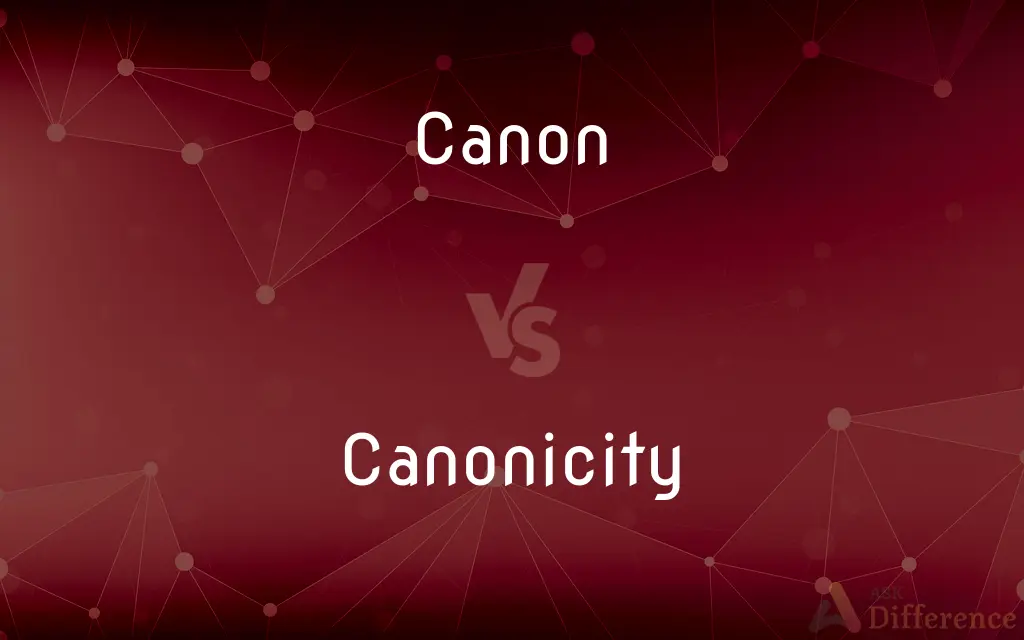Canon vs. Canonicity — What's the Difference?
By Fiza Rafique & Urooj Arif — Updated on March 19, 2024
Canon refers to the authoritative body of works or principles, while canonicity concerns the standards or criteria for inclusion in this body.

Difference Between Canon and Canonicity
Table of Contents
ADVERTISEMENT
Key Differences
Canon typically denotes an officially accepted set of texts, principles, or rules in various fields like literature, music, or religious doctrine. It represents the authoritative collection that is considered representative, important, or binding. On the other hand, canonicity refers to the quality, state, or criteria that determine whether a work or principle belongs to the canon. It involves the process and standards by which decisions of inclusion are made.
In literature and arts, canon signifies the recognized, exemplary works that form the core of the field, serving as benchmarks of excellence and influence. Canonicity, however, delves into the evaluative process, exploring why and how certain works achieve canonical status. It examines the criteria such as historical significance, influence, and inherent value that contribute to a work's acceptance into the canon.
In religious contexts, the term canon refers to the collection of sacred texts deemed authoritative and inspired, such as the Bible in Christianity. Canonicity in this realm involves theological, historical, and ecclesiastical considerations that determine the inclusion of texts in the sacred canon. It is concerned with the authenticity, divine inspiration, and doctrinal consistency of these texts.
Canon also applies to franchises and fictional universes, denoting the official storyline and elements recognized by the creators or authoritative sources. Canonicity within this scope addresses the criteria and processes by which storylines, characters, and events are considered part of the official narrative, distinguishing them from fan fiction or non-canonical works.
While canon represents the established, authoritative body of work, canonicity focuses on the underlying principles and processes that govern the selection and recognition of these canonical elements. It is a reflective and analytical concept, examining the dynamics of inclusion and the standards of judgment that elevate certain works or principles to canonical status.
ADVERTISEMENT
Comparison Chart
Definition
The officially accepted set of texts, principles, or rules
The quality or criteria for inclusion in the canon
Focus
Recognized, authoritative works or principles
Standards and processes for inclusion
Application
Literature, arts, religion, fictional universes
Evaluation and analysis of canonical criteria
Significance
Represents benchmarks of excellence and influence
Concerns the evaluative process and criteria of inclusion
Contextual Use
Specific works or principles considered canonical
The process of determining what is considered canonical
Compare with Definitions
Canon
An established set of principles or code of laws, often religious in nature.
The canonical texts of the religion guided its followers' beliefs and practices.
Canonicity
The state or condition of being canonical or accepted as part of the canon.
The canonicity of the new texts was hotly debated among scholars.
Canon
Used to refer to the authentic works of a particular author or artist.
The museum's exhibit features paintings from the canon of the Renaissance master.
Canonicity
In religious contexts, refers to the process of recognizing texts as divinely inspired.
The council convened to discuss the canonicity of various apocryphal writings.
Canon
Represents the standard against which other works are measured.
Her novel was soon regarded as part of the modern literary canon.
Canonicity
Reflects the ongoing discourse and reassessment of what constitutes the canon.
Literary critics continue to debate the canonicity of certain postmodern works.
Canon
The collection of works considered representative and authoritative in a particular field.
Shakespeare's plays are central to the English literary canon.
Canonicity
Pertains to the criteria used to determine the canonical status of a work or principle.
The canonicity of artworks is often influenced by their historical significance and impact.
Canon
In media and entertainment, the material accepted as officially part of the story in an established universe.
Only the original trilogy is considered canon in some fan circles.
Canonicity
In fandoms, canonicity can involve complex determinations about what is officially part of a universe.
Fans frequently discuss the canonicity of various story arcs in comic book series.
Canon
Archaic spelling of canyon
Canonicity
Of, relating to, or required by canon law.
Canon
An ecclesiastical law or code of laws established by a church council.
Canonicity
Of or appearing in the biblical canon.
Canon
A secular law, rule, or code of law.
Canonicity
Conforming to orthodox or well-established rules or patterns, as of procedure.
Canon
An established principle
The canons of polite society.
Canonicity
Of or belonging to a cathedral chapter.
Canon
A basis for judgment; a standard or criterion.
Canonicity
Of or relating to a literary canon
A canonical writer like Keats.
Canon
The books of the Bible officially accepted as Holy Scripture.
Canonicity
(Music) Having the form of a canon.
Canon
A group of literary works that are generally accepted as representing a field
"the durable canon of American short fiction" (William Styron).
Canonicity
The degree to which something is canonical.
Canon
The works of a writer that have been accepted as authentic
The entire Shakespeare canon.
Canonicity
The state or quality of being canonical; agreement with the canon.
Canon
Material considered to be officially part of a fictional universe or considered to fit within the history established by a fictional universe
"The Harry Potter series was one of the first pieces of media to inspire widespread fan fiction writing, probably because its popularity coincided with the early days of the Internet, but its creator has also shown herself more than willing to keep updating the canon" (Emma Cueto).
Canon
Canon The part of the Mass beginning after the Preface and Sanctus and ending just before the Lord's Prayer.
Canon
The calendar of saints accepted by the Roman Catholic Church.
Canon
(Music) A composition or passage in which a melody is imitated by one or more voices at fixed intervals of pitch and time.
Canon
A member of a chapter of priests serving in a cathedral or collegiate church.
Canon
A member of certain religious communities living under a common rule and bound by vows.
Canon
Variant of canyon.
Canon
A generally accepted principle; a rule.
The trial must proceed according to the canons of law.
Canon
A formally codified set of criteria deemed mandatory for a particular artistic style of figurative art.
The Canon of Polykleitos
Canon
A group of literary works that are generally accepted as representing a field.
Canon
The works of a writer that have been accepted as authentic.
The entire Shakespearean canon
Canon
A eucharistic prayer, particularly the Roman Canon.
Canon
A religious law or body of law decreed by the church.
We must proceed according to canon law.
Canon
A catalogue of saints acknowledged and canonized in the Roman Catholic Church.
Canon
In monasteries, a book containing the rules of a religious order.
Canon
A piece of music in which the same melody is played by different voices, but beginning at different times; a round.
Pachelbel’s Canon has become very popular.
Canon
(Roman law) A rent or stipend payable at some regular time, generally annual, e.g., canon frumentarius
Canon
Those sources, especially including literary works, which are considered part of the main continuity regarding a given fictional universe.
A spin-off book series revealed the aliens to be originally from Earth, but it's not canon.
Canon
(cookery) A rolled and filleted loin of meat; also called a cannon.
A canon of beef or lamb
Canon
A large size of type formerly used for printing the church canons, standardized as 48-point.
Canon
The part of a bell by which it is suspended; the ear or shank of a bell.
Canon
A clergy member serving a cathedral or collegiate church.
Canon
A canon regular, a member of any of several Roman Catholic religious orders.
Canon
A law or rule.
Or that the Everlasting had not fixedHis canon 'gainst self-slaughter.
Canon
A law, or rule of doctrine or discipline, enacted by a council and confirmed by the pope or the sovereign; a decision, regulation, code, or constitution made by ecclesiastical authority.
Various canons which were made in councils held in the second centry.
Canon
In monasteries, a book containing the rules of a religious order.
Canon
A catalogue of saints acknowledged and canonized in the Roman Catholic Church.
Canon
A member of a cathedral chapter; a person who possesses a prebend in a cathedral or collegiate church.
Canon
A musical composition in which the voices begin one after another, at regular intervals, successively taking up the same subject. It either winds up with a coda (tailpiece), or, as each voice finishes, commences anew, thus forming a perpetual fugue or round. It is the strictest form of imitation. See Imitation.
Canon
The largest size of type having a specific name; - so called from having been used for printing the canons of the church.
Canon
The part of a bell by which it is suspended; - called also ear and shank.
Canon
See Carom.
Canon
A deep gorge, ravine, or gulch, between high and steep banks, worn by water courses.
Canon
A rule or especially body of rules or principles generally established as valid and fundamental in a field or art or philosophy;
The neoclassical canon
Canons of polite society
Canon
A priest who is a member of a cathedral chapter
Canon
A ravine formed by a river in an area with little rainfall
Canon
A contrapuntal piece of music in which a melody in one part is imitated exactly in other parts
Canon
A complete list of saints that have been recognized by the Roman Catholic Church
Canon
A collection of books accepted as holy scripture especially the books of the Bible recognized by any Christian church as genuine and inspired
Common Curiosities
What does canon mean in literature?
In literature, canon refers to the collection of works deemed authoritative, significant, and exemplary within the field.
How is canonicity determined in religious texts?
Canonicity in religious texts is determined through theological, historical, and ecclesiastical criteria, including authenticity and divine inspiration.
What role does canonicity play in fandoms?
Canonicity in fandoms establishes what is officially part of a narrative universe, guiding fan engagement and content creation.
Is canon the same across all cultures?
Canon can vary significantly across cultures, reflecting differing literary traditions, historical contexts, and values.
Can a work be removed from the canon?
While rare, works can be reevaluated and potentially deemed less central to the canon, especially as cultural and academic perspectives shift.
Can the canon change over time?
Yes, the canon can evolve as new works gain recognition or as perspectives on existing works change, reflecting shifts in cultural and scholarly values.
How does canonicity affect the interpretation of works?
Canonicity can influence how works are interpreted and valued, as canonical status often lends a work greater significance and authority.
Can personal preference affect one's view of the canon?
Personal preference can influence individual views of what constitutes the canon, though official recognition often relies on broader consensus.
How are new works added to the canon?
New works are added to the canon through a combination of critical acclaim, influence, enduring popularity, and scholarly consensus.
Does canonicity apply to all genres of literature and art?
Canonicity applies across genres, but the criteria and significance can vary greatly depending on the specific field and cultural context.
What challenges arise in determining canonicity in rapidly evolving media?
In rapidly evolving media, challenges include keeping pace with new content, diverse platforms, and shifting fan and creator interactions.
How do educational institutions influence the canon?
Educational institutions play a significant role in shaping the canon through curriculum choices, scholarly research, and literary criticism.
Are there different canons for different communities?
Yes, different communities may have their own canons, reflecting specific cultural, religious, or regional preferences and values.
How does canonicity relate to cultural heritage?
Canonicity contributes to cultural heritage by preserving and highlighting works that are considered pivotal to a culture's literary and artistic identity.
How do critics and scholars impact canonicity?
Critics and scholars influence canonicity through analysis, debate, and publishing works that argue for the inclusion or exclusion of certain texts.
Share Your Discovery

Previous Comparison
Droodle vs. Doodle
Next Comparison
Alkaline vs. BoraxAuthor Spotlight
Written by
Fiza RafiqueFiza Rafique is a skilled content writer at AskDifference.com, where she meticulously refines and enhances written pieces. Drawing from her vast editorial expertise, Fiza ensures clarity, accuracy, and precision in every article. Passionate about language, she continually seeks to elevate the quality of content for readers worldwide.
Co-written by
Urooj ArifUrooj is a skilled content writer at Ask Difference, known for her exceptional ability to simplify complex topics into engaging and informative content. With a passion for research and a flair for clear, concise writing, she consistently delivers articles that resonate with our diverse audience.














































